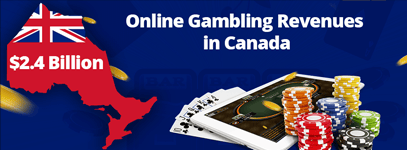Tax, Regulate, and Control Online Gambling
It is admirable that the CLC remains dedicated to defending citizens against illicit gambling websites. There's no disputing that. What is confusing is the advocacy group's choice to view private operators as foreign dangers. In truth, Canadian players prefer "grey market" operators, right now and across past decades, over the provincial lottery sites. It is probably a sign that the few provincial online gaming choices other than Ontario dissatisfy consumers.
Perhaps the age-old Sun Tzu motto of holding your friends near and your enemies closer trivializes the situation. However, it makes much more sense to take control or to keep a close eye on the situation if you are concerned. Failure to legalize online gambling beyond the provincial lottery continues to fall short in preventing their existing players from gambling. However, there's no need to worry about cannibalization or even extinction. Not when you look at Ontario online casinos and sportsbetting sites.
Provincial and Private Operators Can Thrive Under Regulation
Critics of Ontario's decision to open to private operators predicted an overcrowded market that would eventually lead to a hierarchy akin to Lord of the Flies, with decisive ruling over the weak. Sounds spooky. Although there is some validity, the market has proven to be rather friendly. For Ontario Lottery and Gaming Corporation, particularly. In the fiscal year 2022-2023, OLG saw notable expansion alongside the regulated market despite competition from over 70 online gambling operators
In the FY 2022-2023, the Crown corporation's online gambling operations brought in around $561 million. Compared to the previous year's $427 million total before the open market, it is a 31% gain. As a result, the OLG outperformed its rivals. In Ontario, the online sports betting, poker, and casino industries combined generated $1.4 billion in gaming income over the same period, according to iGaming Ontario. Everyone gets a piece of the pie; there's even enough for seconds and thirds. Since then, the figures have improved significantly, which means the taxable revenue amount will also rise.
According to IGO, the total revenue from online gambling for the fiscal year 1 April 2023 to 31 March 2024 was $2.4 billion. For those doing the math at home, it represents a 71% or $1 billion increase over the previous year. Ontario is now North America's largest online gambling market in revenue because of that $2.4 billion. Later this year, when OLG produces its annual report, the astounding figures will rise again.
Legalise an Activity that is Already Taking Place
The fact that Ontario advertisements act as competition in areas where they are illegal is one of the CLC's primary complaints about them. According to Savoie, it is less than ideal when competitors show up in your market as competitors when they are not competitors. The critique is undoubtedly true, but it also misses the mark. These sportsbooks directly compete with provincial enterprises, regardless of location, whether it's Ontario, Curacao, or Latvia.
Nothing is stopping folks from playing at grey market websites right now. Naturally, there is only one logical way to change things: legalize the activities that are already taking place. In this approach, the provinces take charge of an additional source of taxable income, retain the tax revenue domestically, and significantly improve services for problem gambling and consumer protection. The question is, what is the amount of money at stake here?
As stated by the Lotteries and Gaming Saskatchewan's Brian Miller, the coalition calculates that illicit or grey market websites take around $1.8 billion away from legitimate operators in Canada every year. Using Ontario's 20% yearly tax rate, it works out to over $350 million being sent out of the nation annually for an already-occurring activity. That is an overwhelming endorsement for regulation and legalization.
Regulation Can Address Ad-Specific Concerns
Regulation provides an efficient resolution to the CLC's ad-specific issues, while it is not as tactfully presented as the remedy to many of its complaints. The regulation would negate the group's primary complaint, which is that operators shouldn't be permitted to advertise outside of their registered domains. Regulation would legally permit advertising to most operators who already advertise. In addition, the provinces would benefit financially and have control.
However, this isn't meant to be interpreted as promoting more advertisements. The idea is that provinces could control more about what and who may air if online gambling were regulated. The Alcohol and Gaming Commission of Ontario responded to the public outcry regarding the quantity and content of sports betting advertisements by doing precisely that.
The AGCO implemented new regulations on February 28th where celebrities and athletes are prohibited from appearing in Ontario betting ads. This does, however, come with the disclaimer that well-known figures may still show there if they're advocating responsible gaming in Canada. Notwithstanding the details, Ontario remains a model for what can be achieved by provinces exercising regulatory authority over online third parties.
Volume of Gambling Ads According to Top 10
The jury is still out Regarding the alleged ad difficulties. Separate Top 10 assessments, however, revealed a far lower volume of advertising. According to our first research, just 9.3% of the promos were linked to gambling during the six NFL games in December last year. Only 65 out of 698 advertisements that were shown across four different networks made up this total.
The examination of Super Bowl ads in February came up with similar results. Six of the 175 advertisements that aired between 6 to 10 pm were for gambling. That's only 2.9%, according to a quick check on the calculator app. Naturally, these are not scientific studies. Instead, they are just snapshots. All the same, each set of findings raises serious questions about the idea that states or gambling authorities cannot regulate advertising. It's not something critics should overlook, but it is also not science. It is the type of knowledge that can greatly assist the CLC in transforming a perceived vulnerability into an asset.










